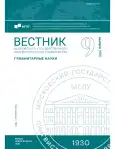Cognitive Aspects of Zoonym Representation in the Phraseology of Germanic Languages: From Stereotypes to National-Cultural Concepts (Based on German and English Languages)
- Authors: Guseva A.E.1, Korchagina E.P.1
-
Affiliations:
- Federal State University of Education
- Issue: No 9(903) (2025)
- Pages: 22-29
- Section: Linguistics
- URL: https://journal-vniispk.ru/2542-2197/article/view/341746
- ID: 341746
Cite item
Full Text
Abstract
The aim of the study is to identify the cognitive features (models) of phraseological units with a zoonym component in Germanic phraseology (based on data from German and English), as well as to determine the process of transitioning from stereotypes to national-cultural concepts through the comparison of phraseological units and their associated cultural concepts in the examined languages. The research material includes phraseological units with a zoonym component from German (205 units) and English (207 units). The data were analyzed using cognitive and comparative analysis methods, as well as descriptive and semantic analysis techniques. The results of the study consist in the conducting a comparative analysis of the unique cultural characteristics of 205 phraseological units with a zoonymic component in the German language and 207 phraseological units in the English language. The study identifies their integral and differentiating features based on stereotypes, applying a cognitive approach to language.
About the authors
Alla Efimovna Guseva
Federal State University of Education
Author for correspondence.
Email: angst51@rambler.ru
Doctor of Philology (Dr. habil.), Professor, Professor at the Department of German and Romance Philology
Russian FederationEkaterina Pavlovna Korchagina
Federal State University of Education
Email: K.korchagina2000@yandex.ru
PhD student, Department of German and Romance Philology
Russian FederationReferences
- Vinogradov, V. V. (1977). O kategorii sostoyaniya v russkom yazyke = On the category of state in the Russian language. Moscow: Nauka. (In Russ.)
- Lakoff, G., Johnson, M. (2023). Metaphors we live by. Ed. by A. N. Baranov. Moscow: LKI. (In Russ.)
- Cherneyko, L. O. (2018). Lingvo-filosofskij analiz abstraktnogo imeni = Linguo-philosophical analysis of the abstract noun. Moscow: Filol. f-t MGU im. M. V. Lomonosova. (In Russ.)
- Telia, V. N. (1996). Russkaya frazeologiya. Semanticheskiy, pragmaticheskiy i lingvokul’turologicheskiy aspekty = Russian Phraseology: Semantic, Pragmatic and Linguocultural Aspects. Moscow: Shkola «Yazyki russkoĬ kul’tury». (In Russ.)
- Molodchinnaya, O. S. (2020). Zoonimy kak sredstvo nominacii cheloveka = Zoonyms as a means of nominating a person. Nauchny Zhurnal, 10(55), 36–38. (In Russ.)
- McCormack, E. (1990). A cognitive theory of metaphor. In Arutyunova, N. D., Zhurinskaya, M. A. (Eds.), Theory of metaphor (pp. 358–386). Moscow: Progress. (In Russ.)
- Kubryakova, E. S., Demyankov, V. Z., Pankrats, Y. G., Luzina, L. G. (1996). Kratkiy slovar kognitivnykh terminov = A Brief Dictionary of Cognitive Terms. Moscow: Filol. f-t MGU im. M.V. Lomonosova. (In Russ.)
- Guseva, A. E., Korchagina, E. P. (2024). Verbalization of the national and cultural stereotypes through zoonymic phraseology based on the material of the English and German languages. Key issues of contemporary linguistics, (4), 97–109.
- Karpenko, E. I. (2009). A Linguocultural Study of Metaphorisation in German insect Names. Vestnik of Moscow State Linguistic University, 559, 213–218. (In Russ.)
- Dobrovolsky, D. O. (2005). Natsionalno-kulturnaya spetsifika frazeologizmov = National and Cultural Specificity of Phraseological Units. Moscow: Nauka. (In Russ.)
- Melikyan, A. A. (2000). Klassifikaciya bibleĬskikh frazeologizmov angliĬskogo yazyka na osnove konceptual’nykh modeleĬ preobrazovaniya znaniya v semanticheskie edinicy yazyka = Classification of biblical phraseologisms in English based on conceptual models of knowledge transformation into semantic units of language: PhD thesis in Philology. Samara. (In Russ.)
Supplementary files










